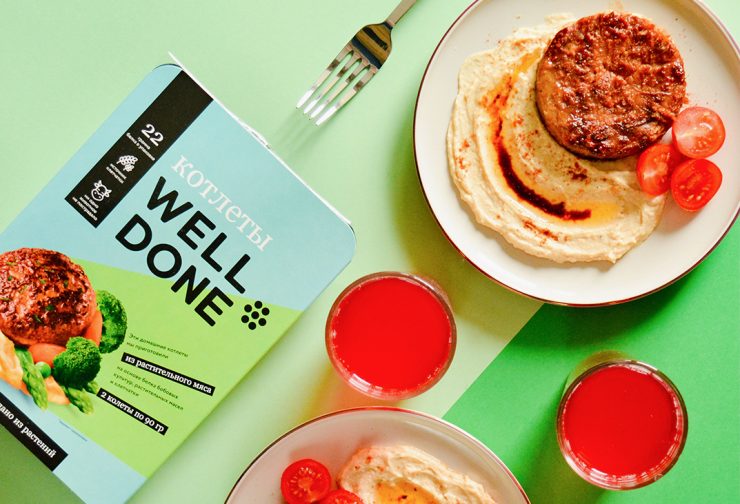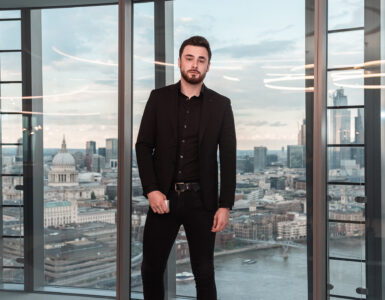In 2019, when Los Angeles-based alternative meat producer Beyond Meat was entering the Russian market and capturing global headlines with its IPO, a local team of five was just gearing up to launch Welldone (Welldone.green), a pioneering startup in Russia’s emerging alternative meat industry.
This competition may seem daunting to some startups, but Welldone’s CEO Alexander Kiselev says Beyond’s entry actually helped educate the Russian market, retailers and investors.
“Basically, they started to develop the market here, they were talking to a lot of the local distributors, food services and retailers,” says Kiselev in an interview with Icebreaker. “This very much helped us, and we were surprised how much response there was to our product.”
He credits Beyond Meat with helping them go to market faster, hitting the supermarket shelves within months of sending their initial proposals to retailers.
“This was really fast for the Russian market to go from proposal to retail, because it usually takes quite a lot of time,” Kiselev notes.
Then there was also a matter of pricing: Welldone was able to offer its products at a significantly lower price compared to Beyond Meat.
By July 2021, Welldone’s team grew from five to 20 people, expanded to 18 cities in Russia and Belarus, and raised $1.5 million from Phystech Ventures with participation from Lever VC, a New York-based fund specializing in alternative protein startups.
“With excellent scientific talent available in the country and much lower input costs, the efficiency of R&D in Russia is an important competitive advantage for international expansion,” says Anna Gishko, a London-based principal at Phystech Ventures.
Gishko also singles out Welldone’s team, their research expertise and relationships with the country’s leading food biotech institutes among the startup’s key advantages.
Welldone plans to speed up its R&D, add a new product in September, and increase production capacity with the help of the latest round.
Russia’s food tech startup space is big on the tech component compared to other parts of the world. Local startups include Greenwise and neMyaso (UnMeat.ru). There is another company called 3D Bioprinting Solutions, which produces 3D-printed squid (yum!) and was planning to print 3D chicken with KFC last year.
Russia’s food tech market is still embryonic, but Russian Agricultural Bank estimated it will reach 1.5% of the entire meat category within four years, or 140,000 tons annually.
The next phase will be a test for Welldone as well as the country’s alternative meat market to see whether the plant-based trend can grow a large, loyal customer base beyond a handful of cities.
In a conversation with Icebreaker, Welldone’s CEO shared his journey as a founder as well as his take on the future of alternative proteins in Russia.
The interview was condensed for clarity.
Icebreaker: How did your background at the food tech accelerator Mabius and experience with big global retailers prepare you to launch Welldone?
Alexander Kiselev: We worked with R&D and biotech projects starting from 2015, helping Russian and foreign companies to solve their biotech challenges. And we started to look and think about what can be distinctive and how to create a really long-term competitive edge.
Icebreaker: When did you decide it was the right time to launch Welldone?
Kiselev: We raised a small fund (Mabius accelerator) and the key category we wanted to invest in was plant-based meat. And actually when we scouted the Russian market, we couldn’t find any team that, from our point of view, was capable of delivering the products.
So on the one hand, there was a huge trend going on in the States and Europe, meat eaters starting to introduce plant-based products to their nutrition. It looked like a very big opportunity. There is quite a big market here, 140 million people in Russia. And no one here seemed to be capable of doing it.
So for me it was a Eureka moment when I understood that, okay, we have the financial resources from the fund, we have the team that is experienced in food, go-to-market strategies and consumer packaged businesses. We have an R&D lab with the necessary equipment.
We were pitching startups that we suggested to invest in, and there was a one-page slide at the end where we proposed that we start R&D into this project ourselves and to allocate some funding to support this initiative. The trend was validated in the States in Europe and basically that’s it, no one in the market has done it yet.
Icebreaker: So at that point, the demand for plant-based meat is an idea that’s not validated in Russia?
Kiselev: We saw that the consumers were willing to for plant-based alternatives in dairy. And at that point, there was a good validation that they will be looking for alternatives for plant-based meat as well.
Icebreaker: Why did you choose an English name for your startup, is the idea to expand and have wider appeal beyond Russia?
Kiselev: There were several reasons. The first is that we believe there are opportunities for Russian companies outside of Russia and a Russian name would be a limiting factor. We wanted to have a name that is applicable in other markets.
The second reason is that the category is very innovative. It resonates mostly with the most advanced consumers, many of whom know English, and are capable of reading and understanding what it means at least.
The idea behind the naming was that we, as a brand, appreciate when people make right choices, and we say ‘well done’ to them. So it’s not about how meat is cooked.
Icebreaker: What was your fundraising process like, how long did it take you?
Kiselev: We started negotiations in November, we talked to about 15 venture firms. And for some of the investors, we were a little bit too early-stage. We got very positive feedback on Phystech Ventures. I reference-checked several companies they invested into, I talked to their CEOs to get feedback on how their interactions were with the fund.
But we were also looking for international investors, someone with international experience because we believe that this will be important for further expansion. For some of them we became quite relevant and one of them was Lever VC. It was clear that they understand the business.
Icebreaker: What do you look for in mentors?
Alexander Kiselev: I think that the entrepreneurial experience is very unique, the challenges each company faces are unique. So what I try to look for when talking and spending time with mentors and experts is to actually find solutions to our goals and our challenges we have leveraging their expertise, their experience and background. That’s why right now we’re more connected to people in big companies, because they have a wide variety of experiences, they know what works and what doesn’t. One company where the CEO is my mentor, they have a wide portfolio of products, they’re very well-established globally and in Russia as well.
Icebreaker: Are you a vegetarian? How do you personally approach your product?
Kiselev: Initially, I was not a vegetarian at all. A few years ago, I tried to stop eating meat. I felt very uncomfortable about it. And about two months ago, all of a sudden I realized that we have great products that can really substitute the flavor that I was missing when I tried before. When we launched the 2.0 version initially in our lab, this was something I was really proud of as a product. To my great surprise, I have really been vegetarian for the last two months and I feel so happy about it.
Icebreaker: What is the motivating factor for Russian consumers specifically, health advantages, the environment or something else?
Kiselev: It’s very different for different types of consumers. For some vegetarian and vegan consumers, this is more of an opportunity to start eating dishes that they haven’t eaten for a long time. For consumers who are very much into ecology, those who think about sustainability — this is the key benefit.
Maybe for some of the consumers, they won’t be able to distinguish the reasons. For me, I myself cannot distinguish what is the key reason I’m doing this.
But I believe that people are made by nature, by God, to do the right things, make the right choices in most of the cases. And it’s good when you don’t have to sacrifice anything. So basically, it’s doing better for you, for the planet and the animals.






Add comment